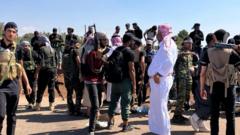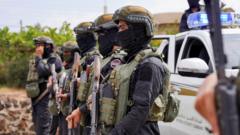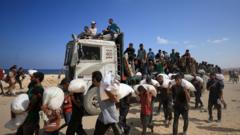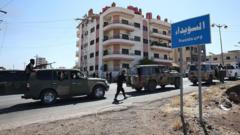Bedouin fighters in Southern Syria have announced a temporary ceasefire with the Druze community, yet they retain the option of resuming hostilities dependent on the fate of captured Bedouins in Suweida. The recent violent clashes resulted in significant casualties and a humanitarian crisis, with limited resources and displacement pushing communities to the brink.
Tensions Persist in Southern Syria: Bedouins Retain Hostility Towards Druze Despite Ceasefire

Tensions Persist in Southern Syria: Bedouins Retain Hostility Towards Druze Despite Ceasefire
As a ceasefire temporarily halts violence between Bedouins and Druze in Suweida, the potential for renewed conflict looms amidst unresolved tensions and casualties.
Bedouin fighters have indicated to the BBC that while they are currently adhering to a ceasefire with the Druze community in southern Syria, they have not dismissed the possibility of reigniting hostilities. Following a week of intense sectarian violence in Suweida, where Bedouins clashed with Druze fighters and government forces — supported by Israeli airstrikes — the Bedouins have retreated to nearby villages.
A recent report from a UK-based monitoring group mentioned a "cautious calm" in the area, yet tribal skirmishes continued, including attacks on nearby villages. From al-Mazara'a, a former Druze-controlled town now under Syrian government control, smoke billowed over the landscape, illustrating the ongoing tensions. At a government checkpoint designed to control Bedouin access to Suweida, armed security personnel blocked fighters from re-entering the city, while Bedouin armed groups demanded the return of their wounded and captured compatriots.
A tribal elder expressed the community's frustration, stating, "If they don't commit to the agreement, we are going to enter again," signaling a readiness for further conflict if their demands are unmet. The situation escalated after the abduction of a Druze merchant, which was a catalyst for the violent outbursts in the region.
Druze residents reported horrific encounters with gunmen, including members of the government forces and foreign fighters, prompting Israel's intervention to safeguard the Druze community. Following significant clashes, Interim President Ahmed al-Sharaa’s government initiated a ceasefire and deployed security forces back to Suweida, where Druze fighters regained control.
The Syrian Observatory for Human Rights reported over 1,120 deaths from the recent violence, which included many civilians and fighters from both sides. With the intensifying conflict resulting in the displacement of over 128,000 people, severe shortages in medical supplies have emerged in Suweida, with humanitarian efforts stymied until aid from NGOs and potential international support arrives.
Reports suggest that the return of Bedouin families who have been displaced is contingent on broader systemic changes in governance that could provide security. A displaced Bedouin woman mentioned that trust could only be established if the government in Damascus asserted control and promoted peace. With the current atmosphere, she indicated that reconciliation seems impossible without stability backing any potential coexistence.
As the situation evolves, local and international actors are being urged to address the ongoing humanitarian needs while ensuring accountability for the atrocities committed during this violent episode in Syria.




















